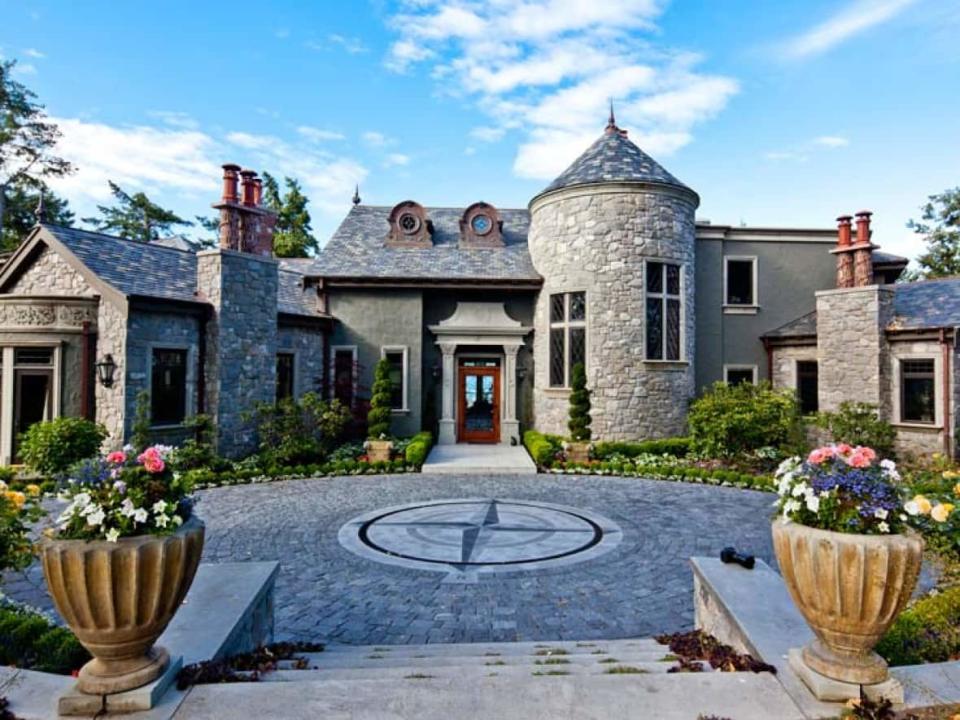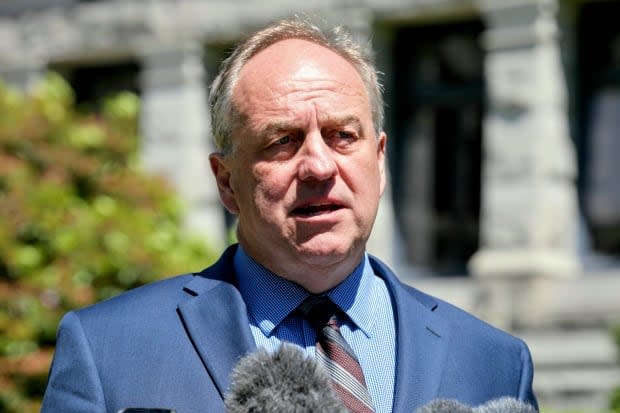Billionaire's association with luxury B.C. mansion highlights property tax loophole

A billionaire's association with a luxury Vancouver Island mansion highlights land title anomalies that mean property transfer and foreign buyers taxes don't apply to purchases of some pricey B.C. homes.
CBC revealed last month that Russian-born billionaire Yuri Milner was the man behind the trust that bought the $18 million Mille Fleurs mansion in 2013 — seven years before the oceanfront property would house Prince Harry and Meghan Markle as they reportedly drew up plans to step back from their royal duties.
But beyond the intrigue associated with ownership of the mansion, the investigation also underscores an unusual property registration situation that predates strata title legislation passed in the 1960s.
In a nutshell, Mille Fleurs is one of a number of properties located on a larger plot of land owned by a corporation known as Towner Bay Country Club Ltd., which was incorporated in 1929. The bigger plot isn't subdivided, and the owners of the homes located within it are all shareholders of the corporation.
When a house is sold, the individual shares change hands, but the sale of one lot doesn't affect the ownership of the larger plot, which means there's no transaction to register with the Land Title Office — and as a result, no payment of the property transfer or foreign buyers taxes.
'Wacky world of taxation'
There's no suggestion anyone has done anything wrong — it's just the way land title is grandfathered in on certain properties.
A similar situation involving 1960s-era apartment buildings in Vancouver's West End has seen real estate agents trumpet in capital letters the fact there's "NO FOREIGN BUYER TAX and the PROPERTY PURCHASE TAX" in listings for multi-million-dollar apartments facing English Bay.

"These things live in their own wacky world of taxation," says Ron Usher, general counsel for the Society of Notaries Public of B.C.
Usher has catalogued with interest what he calls "historical anomalies" like Towner Bay and the West End apartment complexes which — to add another layer of confusion — are known as co-operatives, but are not the same type of rental co-ops that exist in B.C. as affordable housing.
He says they are probably best described as "housing corporations" created prior to the 1966 Strata Title Act as a way for people to have shared ownership of the building in which their apartments were located.
Similar ownership structures exist in older three- and four-storey buildings scattered around the Lower Mainland — often surprising purchasers when they find out there's no strata title on their individual units.
"I think the important point to make — they solved an enormous housing problem for many people before we had stratas," Usher says.
"These are ways in which people bought affordable housing. They were problem-solving schemes as opposed to tax-avoidance schemes."
'Not searching the globe for weird anomalies'
Both Usher and Real Estate Foundation of B.C. professor Tsur Somerville say owning shares in a corporation — as opposed to having your individual property listed with the Land Title Office — has its drawbacks.
By buying shares, the purchaser buys the right to occupy a home on land owned by a larger corporation that sets the rules for occupancy. It's tough to get a mortgage or any other type of financing.
You can't take advantage of first time home buyers programs. And then there's capital gains tax if the property is not your primary residence.

Somerville says it's a stretch to imagine tax-averse plutocrats mining the shortcomings of B.C. strata law for ways to save money.
"The billionaires are running stuff through layers of shell corporations with Panamanian lawyers and shell corporations registered in the Cayman Islands," he said.
"They're not searching the globe for weird anomalies in ownership structure and buying those."
According to the province's property transfer tax calculator, the property tax payable on an $18 million mansion would be $818,000.
Somerville says taken as a whole, the money lost to provincial coffers through land ownership situations that predate strata legislation pales in comparison to the size of British Columbia's property market.
But that doesn't mean tax avoidance isn't an issue — or that corporate ownership of real estate isn't being used to escape both taxes and scrutiny.
'We're worried about putting in rules'
As the former leader of B.C.'s Green Party, Andrew Weaver began talking about the need to close the province's property tax transfer loopholes back in 2014. The issue still riles him, two years after leaving politics.
While in office, Weaver set his sights on bare trusts — a means of separating the name on the title of a piece of real estate from the individuals who actually benefit from its ownership.
A trustee — often a corporation — holds the legal ownership of the property, but all the decisions related to its use belong to the so-called beneficial owner.

During a sale, the new owner would pay whatever the property costs plus an extra $1 for the shares in the bare trustee corporation, whose name remains on the title — meaning there's no need to pay the property transfer tax.
Weaver says B.C. should follow Ontario's lead by tying the property transfer tax to a change in beneficial ownership, not just title.
"Simple change," he said.
"It seems that we're worried about putting in rules. And that's the biggest problem, is there's almost a risk aversion, it seems, to governments putting in rules."
'Committed to improving taxation models'
In answer to questions from CBC about land ownership structures that result in property transfer tax loopholes, B.C.'s Ministry of Finance said the province is "committed to improving taxation models to address challenges like this one."
"One of the first steps in addressing a situation such as this is to ensure we have information about beneficial owners, including information about what they own and the ownership structures they have," the ministry said in a statement.
The government points to the new Land Owner Transparency Registry, a publicly searchable database of anyone with an indirect interest in land. The deadline to file with the first-of-its-kind-in-Canada database is November 2022.
The ministry says it will use the information "to understand what beneficial ownership looks like in B.C., which will support the continued improvement of B.C.'s taxation models."
As for the 27 plots owned by the Towner Bay Country Club, an unanticipated pitfall presented itself in 2014, when the District of North Saanich pondered whether its bylaws would allow more than one "guest cottage" for the whole property — which was, after all, not subdivided.
The solution? Amending the bylaw to consider those plots the same as land registered with the Land Title Office.

 Yahoo Finance
Yahoo Finance 